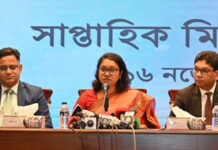Millions of gallons of untreated wastewaters, mainly from industries, are being dumped into the rivers around Dhaka city through as many as 185 outlets every day.
Seventy of the outlets are located at Sayedpur and Murapara in Rupganj of Narayanganj alone, contaminating the Shitalakkhya with toxic industrial waste, said an official of Bangladesh Inland Water Transport Authority, citing a recent survey by the BIWTA.
The rivers are slowly dying as most of the factories are not using effluent treatment plants (ETPs), said the official, wishing anonymity.
Now, in a move to save the rivers, the government has decided to shut down the factories if they fail to start using ETPs within a certain period of time.
“The factories around the Shitalakkhya, the Balu, the Turag and the Buriganga rivers must have functional ETPs within a given period of time. Or else, they will be shut down,” Shipping Minister Shahjahan Khan warned after an inter-ministerial meeting at his ministry yesterday.
The deadline would be announced later, he said.
The ETPs make industrial wastewater less harmful before it is released into the environment.
The factories that have ETPs but do not use those would be fined first, Shahjahan said. “If they still don’t use the ETPs, they too will be shut down.”
On relocation of tanneries, he said they would also be given time to shift to Savar or else they would be shut down.
The tanners in Dhaka city have already defied similar government directives on several occasions.
The meeting also decided to initiate a project to save the rivers from pollution. A feasibility study on the project would begin soon, Shahjahan added.
The much-hyped Tk 17-crore Buriganga-Turag River Cleaning Project, undertaken in 2011, was a fiasco as the authorities failed to plug the sources of pollution.
Environment and Forest Minister Anwar Hossain Manju Housing Minister Mosharraf Hossain, Land Minister Shamsur Rahman Sherif, Dhaka South City Corporation Mayor Sayeed Khokon and Annisul Huq, mayor of Dhaka North City Corporation attended the meeting chaired by Shahjahan Khan.
INDISCRIMINATE
POISONING OF RIVERS
The BIWTA, in its study, identified 48 factories in Narayanganj municipality area that are discharging untreated waste in the Shitalakkhya through 23 outlets.
On the Sadarghat to Ashulia stretch of the Buriganga, it found 56 waste outlets of which 13 belonged to private households, said the BIWTA official, who was closely involved in the survey.
Thirteen industrial outlets were discharging untreated wastewaters in the Turag and the Balu between Tongi Kamarpara and Isapur, he said.
The pollutants are severely harming quantum of dissolved oxygen (DO) in the rivers.
In the first four months of 2012, the DO level was almost zero at all points of the Buriganga. In 2011, the DO level varied from 0.1 to 5.1 milligrams per liter (mg/l), according to a report of the Department of Environment (DoE).
In the Shitalakkhya, zero DO concentration was found at Demra Ghat between January and March. In 2011, the DO level varied from 0.1 to 6.5 mg/l.
No DO presence was found in the Turag from March to June in 2012, according to the report. The previous year, the concentration varied between 0.2 and 5.4 mg/l.
According to a DoE official, there are around 400 washing factories in Keraniganj and 99 percent of them do not have ETPs.
In fact, there are only around 800 ETPs across the country though the number of toxic waste-discharging factories would be no less than 10,000, he said, wishing anonymity.
For an easy solution to the problem, Prof Mujibur Rahman of Bangladesh University of Engineering Technology has suggested setting up of central effluent treatment plants at the industrial clusters, including the export processing zones (EPZs).










